Michael Hemmingson’s Lish Project

Gordon Lish Edited This
Live Giants 11: Sommer Browning & Noah Eli Gordon
You missed the live reading but you can still check out Sommer & Noah’s new books, Either Way I’m Celebrating and The Source, available from the publishers at the according links.
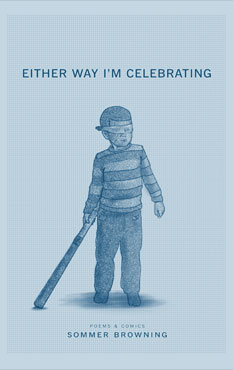
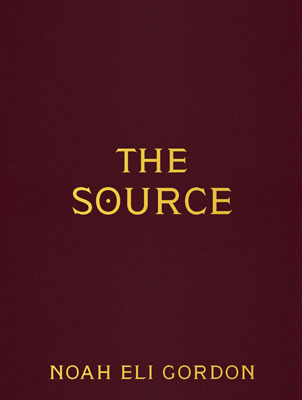
round up: bell hooks, joseph p. wood, jubilat, gordon massman, lowercase letters, et al.

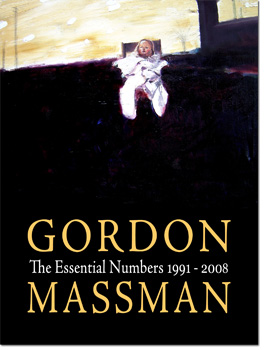 I picked up Gordon Massman’s The Essential Numbers 1991-2008 at AWP. Nobody told me to; I didn’t know that Blake had said things about it. Jesus, Mary, and Joseph. This is the most depraved-and-beautiful book of poems I’ve read maybe ever. I mean, Massman’s language forces me read every poem aloud (which is one of my gauges of good poetry); the sheer music of the language propels me down the page, and when I’ve finished every poem, I feel a little sick. I’m glad this book exists in the world. I’m not sure I’ll get through it. Here’s an interview.
I picked up Gordon Massman’s The Essential Numbers 1991-2008 at AWP. Nobody told me to; I didn’t know that Blake had said things about it. Jesus, Mary, and Joseph. This is the most depraved-and-beautiful book of poems I’ve read maybe ever. I mean, Massman’s language forces me read every poem aloud (which is one of my gauges of good poetry); the sheer music of the language propels me down the page, and when I’ve finished every poem, I feel a little sick. I’m glad this book exists in the world. I’m not sure I’ll get through it. Here’s an interview.
In the chapter on capitalization in The Copyeditor’s Handbook–I was just forced to buy a new one because I spilled grouper juice all over my tried-and-true copy; I bought it at Borders for a big-chunk discount because Borders is hightailing it out of my town–so, in this new copy, under the heading “Personal Names and Titles,” is a debate about capitalization. For fuck’s sake, people. If bell hooks or k.d. lang want their names lowercased, what’s the problem? Well, according to Amy Einsohn, who feels like my bff some days, Bill Walsh says this:
Sure, before “k.d. lang” there was “e.e. cummings.” But, as most good dictionaries…and New York Times style recognize, these are logos. The names are K.D. Lang and E.E. Cummings. To bow to the artists’ lowercase demand…deprives readers of a crucial visual cue…
Lishcast Moonfish Sleepingfish Bookmas

1. Iambik offers a free audio Q/A slash talk with Gordon Lish re: creation, editing, Beckett, Ginsberg, Tao Lin (for real), and various etc., in corollary with the release of his audio books.
2. Cinematheque Press has published a limited edition run of Peter Markus’s classic The Moon is a Fish in a limited edition of 84, with all proceeds going to support the InsideOut Literary Arts Project in Detroit.
3. If you haven’t been following Sleepingfish’s vol iX sequence, you have some reading to do, including new short pieces by Robert Lopez, Jack Boettcher, Elisa Misto, and more more.
4. I got my mom Sebald’s Rings of Saturn and Brautigan’s Trout Fishing in America/The Pill versus the Springhill Mine Disaster/In Watermelon Sugar and J. Robert Lennon’s Pieces for the Left Hand for xmas. I disagree with Adam: books are the only gift I usually actually end up doing something with beyond the day it arrives.
What books did you get people? What did/will you get?
Iambik Audiobooks: Lish, Tillman, Hunt, etc.

Iambik Audiobooks is a new publisher of audio editions of curated literary fiction. Their current roster includes Gordon Lish, Lynne Tillman, J. Robert Lennon, Laird Hunt, Lydia Millet, and several others, all priced at a very reasonable $4.99 for the majority of their titles.
I picked up the 18 hour compendium of Lish reading selections from his recent Collected Fictions. The recording is pristine, and includes often introductions or lead ins by Lish. It’s the first time he’s ever read his own work aloud for the public. Because the hefty length, this one is the most expensive at the site, but still only $9.99 for the whole set, and also available in smaller editions for a lower price. Hearing him read the work himself adds a whole other layer to the fold. You can preview it here [EDIT: the preview is not of Lish himself; some of the works are read by Gregg Margarite]. I feel like I’ll be listening to this again and again over the years. Maybe I’ll drive somewhere, and now I don’t have to buy like Clive Barker.
Really excited to see such an excellently executed version of a great idea. Check them out.
Sarki on Lish
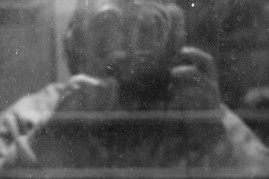 M Sarki with an interesting defense (I guess) of Gordon Lish at EWN. I found the intrigue here in Sarki, not in Lish (not so riveting to revisit the Carver thing). Not sure I’ve seen such reliance on another in judging an individual work. Sarki sends his poems to Lish via mail then gets a YES, NO, or SO SO written on the poem. Sarki writes:
M Sarki with an interesting defense (I guess) of Gordon Lish at EWN. I found the intrigue here in Sarki, not in Lish (not so riveting to revisit the Carver thing). Not sure I’ve seen such reliance on another in judging an individual work. Sarki sends his poems to Lish via mail then gets a YES, NO, or SO SO written on the poem. Sarki writes:
But after so many years of working with him I pretty much have a feel for what he’ll like and what he won’t. I get mostly a Yes these days.
Gordon Massman’s ‘The Essential Numbers’
Ready to want to buy a book?
Read the poem on the back of Gordon Massman’s The Essential Numbers: 1991-2008, just out from Tarpaulin Sky Press:
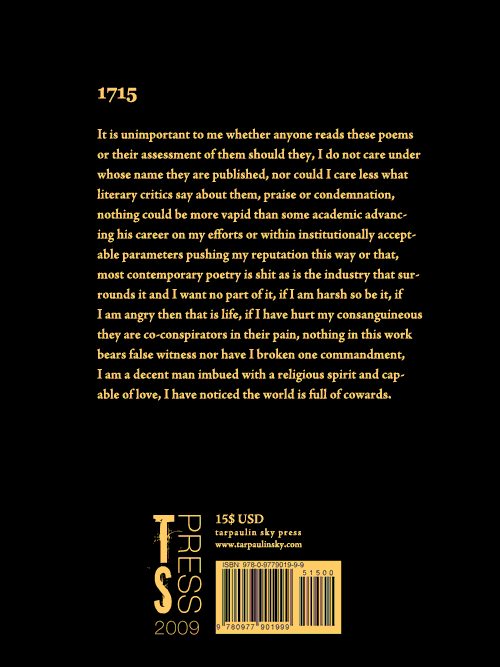
Yeah.
I’ve been reading this for a couple weeks now, a few poems at a time, because it is so brutally right there and fucked and ready to fuck your head, it needs the slow imbibe, the good one. Where so much ‘poetry’ can be yadda, these are words saying something hard and loud, and meaning it.
Sampled from 18 years of Massman’s writing, poems all numbered for titles, all to the teeth.
I.e. here is the first full sentence of 1262:
Dear God: thank you for the physical beauty in the world, etc.
and get fucked.
Lish on Cavett: A Task
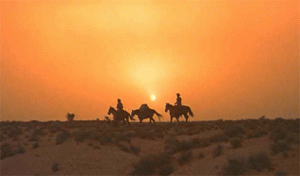
According to his Wikipedia page entry, Gordon Lish appeared on the Dick Cavett show in 1991.
Dear readers, let’s us not rest until we have found a full transcript or video of that interview!
Books I Read in 2020
What follows is a list of all the books I read in 2020.
(What follows that is a series of statistics regarding this list, and some other things.)
- The Free-Lance Pallbearers (1967) by Ishmael Reed (Jan. 2–5)
- Yellow Back Radio Broke-Down (1969) by Ishmael Reed (Jan. 6–8)
- Mumbo Jumbo (1972) by Ishmael Reed (Jan. 9–14)
- Chattanooga (1973) by Ishmael Reed (Jan. 15–16)
- The Last Days of Louisiana Red (1974) by Ishmael Reed (Jan. 20–22)
- Flight to Canada (1976) by Ishmael Reed (Jan. 23–25)
- Imaginary Museums (2020) by Nicolette Polek (Jan. 26–27)
- The Novelist (????) by Jordan Castro (Jan. 28–29)
- *$50,000 (2020) by Andrew Weatherhead (Jan. 30)
- Infinite Hesh (2019) by Thomas J. Gamble (Jan. 31)
- The Network (2010) by Jena Osman (Feb. 3–4)
- Where We Go from Here (2018) by Bernie Sanders (Feb. 4–7)
- The New Jim Crow (2010) by Michelle Alexander (Feb. 12–16)
- Black Against Empire (2012) by Joshua Bloom and Waldo E. Martin Jr. (Feb. 17–21)
- Incognegro (2008) by Frank B. Wilderson III (Feb. 22–28)
- Bring the War Home (2018) by Kathleen Belew (Mar. 2–6)
- Barn 8 (2020) by Deb Olin Unferth (Mar. 6–10)
- *Revolution (2011) by Deb Olin Unferth (Mar. 11–12)
- Will and Testament (2016) by Vigdis Hjorth (Mar. 13–17)
- Drive Your Plow Over the Bones of the Dead (2009) by Olga Tokarczuk (Mar. 18–22)
- Bleak House (1853) by Charles Dickens (Mar. 22–Apr. 11)
- Flights (2007) by Olga Tokarczuk (Mar. 23–31)
- A House in Norway (2014) by Vigdis Hjorth (Apr. 1–7)
- Speedboat (1976) by Renata Adler (Apr. 12–13)
- Reuben Sachs (1888) by Amy Levy (Apr. 14–15)
- For the Fighting Spirit of the Walnut (1982) by Takashi Hiraide (Apr. 16)
- Discounted (2020) by Erik Stinson (Apr. 17)
- The House of Mirth (1905) by Edith Wharton (Apr. 17–21)
- Ethan Frome (1911) by Edith Wharton (Apr. 22–23)
- The Age of Innocence (1920) by Edith Wharton (Apr. 26–30)
- True Suede (2020) by Jon Leon (May 1)
- The Prick of Noon (1985) by Peter DeVries (May 2–4)
- Amazons (1980) by Cleo Birdwell (May 6–11)
- *American Psycho (1991) by Bret Easton Ellis (May 12–21)
- *A Book of Common Prayer (1977) by Joan Didion (May 22–26)
- *Salvador (1983) by Joan Didion (May 28–June 2)
- *Democracy (1984) by Joan Didion (June 7–10)
- *Miami (1987) by Joan Didion (June 11–16)
- The First Civil Right (2014) by Naomi Murakawa (June 17–18)
- The End of Policing (2017) by Alex S. Vitale (June 19–20)
- After Henry (1992) by Joan Didion (June 23–28)
- *The Last Thing He Wanted (1996) by Joan Didion (June 29–July 1)
- Political Fictions (2001) by Joan Didion (July 1–4)
- Fixed Ideas: America Since 9.11 (2003) by Joan Didion (July 5)
- Where I Was From (2003) by Joan Didion (July 6–8)
- Old Possum’s Book of Practical Cats (1939) by T. S. Eliot (July 6–10)
- Four Quartets (1943) by T. S. Eliot (July 6–10)
- Hellbox (1947) by John O’Hara (July 9–12)
- Audition (1997) by Ryu Murakami (July 14–15)
- Death in Her Hands (2020) by Ottessa Moshfegh (July 16–17)
- Mountain Road, Late at Night (2020) by Alan Rossi (July 18–19)
- A Rage to Live (1949) by John O’Hara (July 20–31)
- The Farmer’s Hotel (1951) by John O’Hara (Aug. 1–2)
- A Family Party (1956) by John O’Hara (Aug. 4)
- Baseless (2020) by Nicholson Baker (Aug. 6–10)
- U and I (1991) by Nicholson Baker (Aug. 13–14)
- Vox (1992) by Nicholson Baker (Aug. 15–17)
- The Fermata (1994) by Nicholson Baker (Aug. 18–22)
- Vernon Subutex 1 (2015) by Virginie Despentes (Aug. 22–24)
- Vernon Subutex 2 (2015) by Virginie Despentes (Aug. 26–29)
- Frantumaglia (2016) by Elena Ferrante (Aug. 30–Sept. 3)
- Coin Locker Babies (1980) by Ryu Murakami (Sept. 4–9)
- Popular Hits of the Showa Era (1994) by Ryu Murakami (Sept. 10–12)
- The Lying Life of Adults (2019) by Elena Ferrante (Sept. 12–17)
- Afropessimism (2020) by Frank B. Wilderson III (Sept. 18–22)
- The Shock Doctrine (2007) by Naomi Klein (Sept. 23–29)
- Different Seasons (1982) by Stephen King (Sept. 30–Oct. 3)
- The Castle of Otranto (1764) by Horace Walpole (Oct. 9–10)
- Tales of the Grotesque and Arabesque, vol. 2 (1840) by Edgar Allan Poe (Oct. 12–13)
- Tales (1845) by Edgar Allen Poe (Oct. 14–21)
- The Silence (2020) by Don DeLillo (Oct. 21)
- Yellow Grass (2020) by Josh Barber and Stephanie Hurtado (Oct. 22)
- *Frankenstein (1818) by Mary Shelley (Oct. 22–24)
- The Cipher (2020) by Molly Brodak (Oct. 23–25)
- Instructions for a Painting (2007) by Molly Brodak (Oct. 25)
- Dracula (1897) by Bram Stoker (Oct. 25–30)
- The Haunting of Hill House (1959) by Shirley Jackson (Nov. 1–3)
- The Sketch Book of Geoffrey Crayon, Gent. (1820) by Washington Irving (Nov. 4–10)
- Shrovetide in Old New Orleans (1978) by Ishmael Reed (Nov. 11–17)
- Rebecca (1938) by Daphne du Maurier (Nov. 12–22)
- Cab Calloway Stands in for the Moon or The Hexorcism of Noxon D Awful (1970) by Ishmael Reed (Nov. 19)
- God Made Alaska for the Indians (1982) by Ishmael Reed (Nov. 19–21)
- Beloved (1987) by Toni Morrison (Nov. 23–26)
- Jazz (1992) by Toni Morrison (Nov. 27–30)
- Paradise (1997) by Toni Morrison (Dec. 1–5)
- Long Live the Post Horn! (2012) by Vigdis Hjorth (Dec. 6–7)
- Vernon Subutex 3 (2017) by Virginie Despentes (Dec. 7–11)
- Wuthering Heights (1847) by Emily Brontë (Dec. 12–18)
- *Jane Eyre (1847) by Charlotte Brontë (Dec. 19–25)
- *Wide Sargasso Sea (1966) by Jean Rhys (Dec. 26–28)
- The Left Bank and Other Stories (1927) by Jean Rhys (Dec. 28–30)
- Midwinter Day (1982) by Bernadette Mayer (Dec. 31)
*Previously read
READ MORE >Every Book I Read in 2016
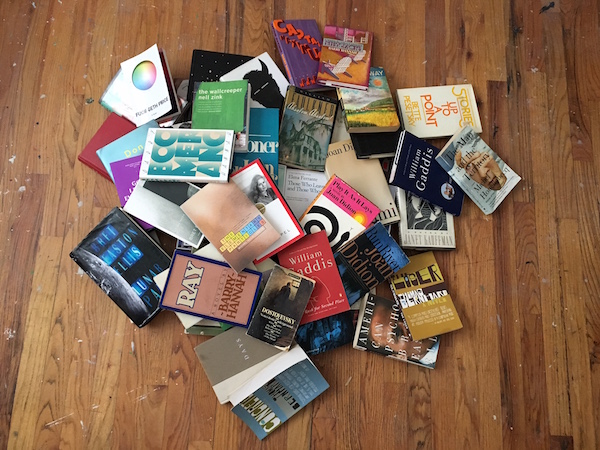
Absalom, Absalom! by William Faulkner. (Jan. 19-26)
A lot of things were happening, and I thought I was in love, maybe, ultimately, wrongly, but I was distracted. And I was devastated, and I decided to challenge myself with a difficult read. I hadn’t been reading much by the end of 2015. Bad things were happening. The light in my room was affected by a red lampshade from a previous tenant, and I lived in Bushwick, and I often raced to get through my allotted daily seventy or so pages so I could go to sleep. I wasn’t talking to anyone, and I had no one to talk to about the book. The book is about history and the removal of the experience from the event. I felt like I missed a decent amount, that there seriously lacked the emotion of Faulkner’s other great works, but I enjoyed the places and the desperate, pre-suicidal voice of Quentin, who felt like an old friend, from a time when I had been more excited about literature and life. I was happy when the novel was over.
Lolita by Vladimir Nabokov (late Dec. 2015-Jan. 31)
I started this book sometime in December (but it was not the first book I read in 2016), and found it pedantic and boring. But after finishing Absalom!, driven (not in a car, but figuratively) to my parents’ house, I felt I had no excuse but to push through it. I hate letting a so-called classic defeat me, or get past me, and I hope to one day lay that feeling to rest. If people like this book so much it must be for a reason; there are some nice sentences, but people probably just like it because it’s like a movie, and I read it by the fire, while my parents watched TV. I read the majority in two sittings that way. Sometime earlier, however, a woman approached me, at my cashiering job at the food coop, and told me I was disgusting for reading Lolita in public. I told her I wasn’t.
The Tennis Handsome by Barry Hannah (Feb. 1-2)
I had fallen into some weird freelance things after quitting my salaried, union-benefitted, university library position the previous summer. I had reason to join the public library and was ripping video of a fashion label to media cards, testing that they worked and mailing them out all over the world at a highly inflated rate. It was nice to make money off so little work, but the work soon went away, and I had to find more. Hannah’s fourth novel is an amalgam and extension of several stories from his hit collection Airships, and is mostly about sex, like a lot of his early work. It was a pleasant read for the most part, even making me laugh, and then I was in Massachusetts. I didn’t have a car and was out of touch with most of my old friends. I didn’t have much reason to go back to Brooklyn.
January 2nd, 2017 / 11:46 am
